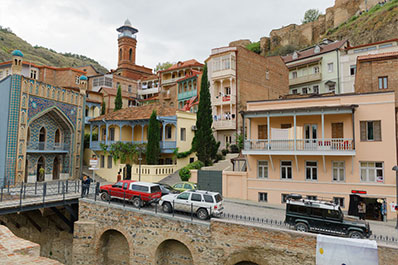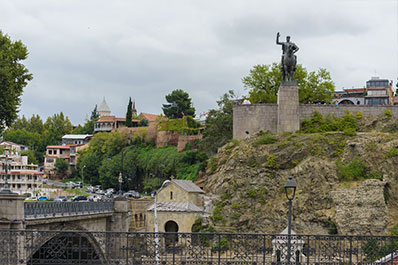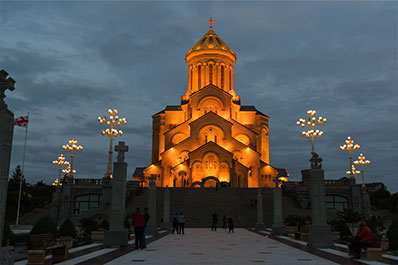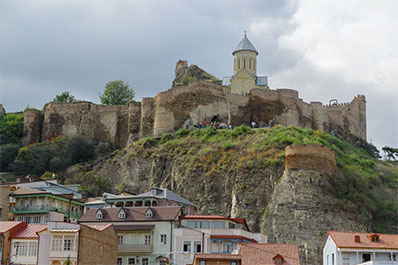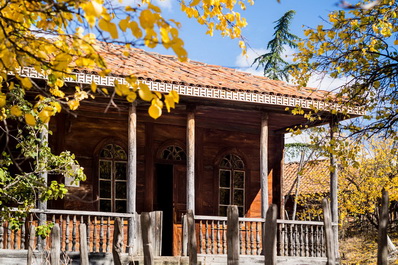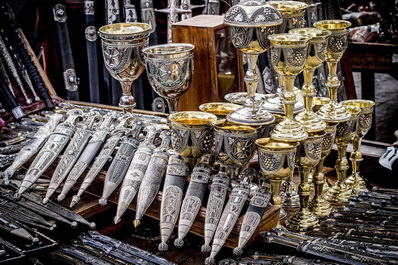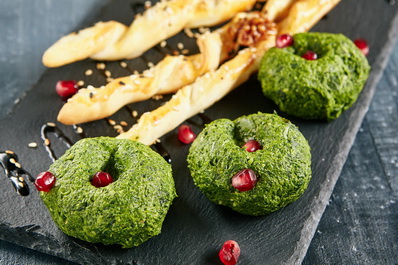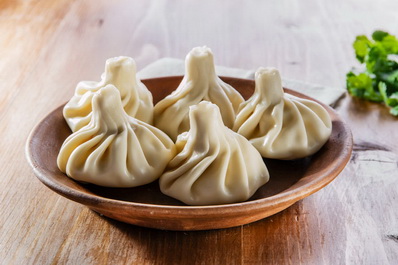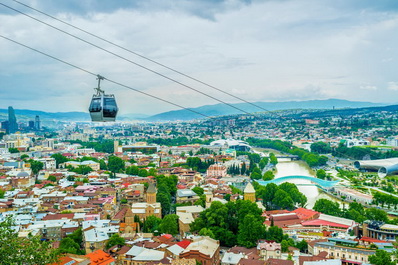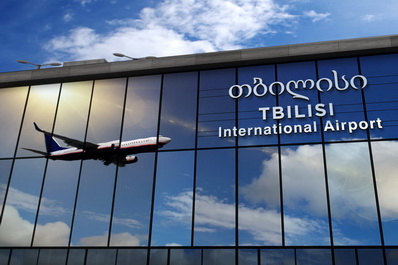Tbilisi - Capital of Georgia
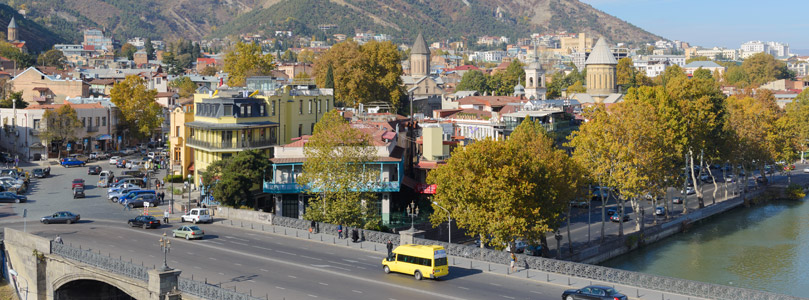
Meaning in Old Georgian: warm place
Highest point: 770 meters above sea level
Lowest point: 380 meters above sea level
Official language: Georgian
Popular languages: Russian
Population: 1,172,000 people
Time zone: UTC+4
Phone code: +995 32
Zip code: 0101 - 0199
Automobile codes: AAA - AAZ
Tbilisi, Georgia's vibrant capital, straddles the Kura River, breathing life into its banks. In recent times, the city has emerged as a bustling metropolis, boasting a population north of a million. Year-round, it magnetically draws thousands of visitors, eager to absorb its rich architectural heritage, meander through its verdant parks, and marvel at the cityscape from atop Mount Mtatsminda. This panoramic perch, the city's highest vantage point, is best reached aboard the iconic Tbilisi funicular.
The soul of Tbilisi lies in its varied neighborhoods, each radiating its own unique vibe, a testament to generations of its industrious inhabitants. From the enchanting Old Town, adorned with intricate balconies and time-worn red brick homes, to the aristocratic charm of Sololaki with its grand estates. Then there's the chic narrow byways of Vera, juxtaposed with the sleek glass high-rises of Vake, shadowing its expansive green park. The wonders of Tbilisi are manifold, and each exploration imprints warm, lasting memories.
Interestingly, Tbilisi's moniker translates to "warm place", rooted in ancient lore. Legend has it that in the latter half of the 5th century AD, King Vakhtang I Gorgasali of Iberia was on a pheasant hunt around Sololak Ridge. During this pursuit, his prized falcon gave chase, only to vanish from view. The king's quest for his bird led him to a rejuvenating discovery - the falcon, healed by a hot sulfur spring. Recognizing this natural treasure, Gorgasali envisioned a city around these therapeutic waters. Shifting the capital from Mtskheta, Tbilisi - the 'warm city', sprang to life by these springs.
How to Get to Tbilisi?
Shota Rustaveli Airport in Tbilisi welcomes travelers from across the globe, servicing flights from cities including Doha, Baku, Istanbul, Athens, Munich, Riga, Dubai, Amsterdam, Paris, and several more.
For those nearby, Georgia's neighboring countries - Russia, Armenia, Azerbaijan, and Turkey - offer convenient entry points. As of 2023, direct flights from Moscow to Tbilisi are operational via Georgian Airways. Alternatively, the Verkhny Lars land border crossing provides a scenic 160-kilometer journey to Tbilisi via the picturesque Georgian Military Road.
Journeys from Armenia to Tbilisi can be undertaken by train, shuttle bus, or cab. For up-to-date ticket information, schedules, and prices, a visit to the Central Bus and Railway Station is advisable. A swift half-hour flight from Yerevan to Tbilisi is also an option. If you're looking to explore both Armenia and Georgia seamlessly, consider engaging with tour organizers like Orexca, ensuring a well-coordinated, enriching experience covering top attractions.
Language
Georgian, the official language, is predominantly spoken in Tbilisi and throughout Georgia. However, owing to historical ties, Russian remains a popular secondary language. With tourism flourishing, many in the hospitality industry are increasingly incorporating English into their services. A small linguistic gesture, like saying "Gamarjoba" (Hello) or "Madloba" (Thank you), goes a long way in connecting with the ever-welcoming Georgians, who appreciate tourists taking an interest in their language.
Currency
The Georgian lari (GEL) is the official currency. Travelers will encounter coins in denominations of 1, 2, 5, 10, 20, and 50 tetri, along with 1 and 2 lari coins. Additionally, banknotes come in values of 5, 10, 20, 50, 100, and 200 GEL. ATMs in Georgia dispense cash in lari, US dollars, and euros. For those needing to exchange foreign currency, the airport and numerous city exchange points offer services, with a concentration on Rustaveli Avenue, Kote Afkhazi Street, and Gorgasali Square. While lari is the standard currency for most transactions, those seeking long-term stays might find accommodations priced in US dollars.
Internet and SIM cards
Georgia boasts three leading mobile and internet providers: Geocell, Magti, and Beeline. Each presents an array of packages tailored to varied connectivity needs. Daily plans might start as low as GEL 2, while monthly services hover between GEL 5 to 30. For those seeking short-term solutions, providers also furnish extra data packages for hours or a couple of days. In Tbilisi, staying connected is practically guaranteed. Wi-Fi in Tbilisi is ubiquitously available, ranging from quaint cafes to bustling city squares offering complimentary internet access. If you're staying with a local, chances are, they've got a robust Wi-Fi connection. For those looking to grab a SIM card, remember to carry your passport—it's a must for purchase. Provider outlets are conveniently located at the Tbilisi airport and dotted along the central Rustaveli Avenue.
Is Tbilisi Safe?
Tbilisi prides itself on its welcoming and secure ambiance, allowing visitors to roam freely day or night. Its amiable locals often go out of their way to assist tourists, and there's even a culture of returning lost items found in public spaces. Nevertheless, travelers should exercise basic caution—keep an eye on personal belongings and avoid leaving them unattended.
While Tbilisi is largely safe, it's advisable to stick to official cab services and avoid wandering in unfamiliar areas post-dark. A word of caution about the city's stray dogs; they're typically harmless but can be intimidating in groups. If you've been out partying, ensure you've planned a safe route back. Remember, your safety is your responsibility.
A Brief History of Tbilisi
Tbilisi, a metropolis with a rich tapestry spanning over 1,500 years, has seen its fair share of conquests and influences. Over its storied past, the city faced occupation upwards of 20 times, often yielding to its captors. For instance, in 645 AD, it became a vassal to the Arab Caliphate, submitting tributes for several centuries. However, the Arab grip waned, paving the way for King David IV, the Builder, in the 12th century. This period marked the beginning of Georgia's Golden Age, further immortalized under Queen Tamara, David's descendant.
The city faced subsequent invasions from Khorezmians, Mongols, and Persians—the latter laying waste to its populace and infrastructure. Amidst warfare, natural calamities like earthquakes also left their mark, obliterating historical landmarks. Yet, some treasures, like the Anchishkhati temple, stand resiliently today.
Come 1801, Georgia found itself under the Russian Empire's wing, ushering in an era of reconstruction and cultural renaissance in Tbilisi. However, by 1921, Georgia was integrated into the USSR, remaining under its aegis for nearly seven decades. The post-Soviet 1990s brought newfound independence, albeit marred by internal strife and civil unrest.
Tbilisi Sights & Attractions
Museums of Tbilisi
Tbilisi's museums offer a rich tapestry of experiences, each inviting you to dive deep into the soul of Georgia. A few hours spent exploring 2-3 of these cultural havens provides insights into the essence of Georgian life and thought.
The National Museum of Georgia, perched on Rustaveli Avenue, is a must-see. Over its four expansive floors, you'll discover ancient human skulls, millennia-old artifacts, resplendent gold collections, traditional attire, musical instruments, weaponry, and more. It's a journey through time.
Just a short stroll away stands the elegant Georgian National Gallery (Tbilisi Art Gallery). Here, masterpieces by luminaries like Nikolo Pirosmani and Lado Gudiashvili await, along with works by other celebrated Georgian and international artists.
For a breath of fresh air, the Tbilisi Open Air Museum of Ethnography is a unique outdoor experience. As you amble through re-created village homes from various Georgian regions, you'll be transported to a bygone era. Peek inside some homes for an authentic glimpse of life from centuries past.
For a quirky change of pace, the Museum of Illusions will enchant both the young and young-at-heart. Revel in playful optical deceptions, become a towering giant, dine with multiple avatars of yourself, and lose yourself in captivating kaleidoscope wonders.
Theaters of Tbilisi
Tbilisi's theatrical scene brims with cultural splendor, promising something for every palette. From opera, ballet, and drama to puppetry, jazz concerts, and dynamic shows, the city's stages are alive with creativity.
The Shota Rustaveli Theater is the city's crown jewel. Situated on its namesake avenue, this theater is renowned for its riveting Shakespearean renditions. Their take on "Othello" is particularly celebrated worldwide. Alongside classics, they present a vibrant mix of plays, spanning the gamut from short sketches to profound dramas.
For an opulent evening, the Paliashvili Opera and Ballet Theater beckons. Every facet of this venue, from its grand architecture to the impeccable performances and ornate costumes, promises a magical night out. Regular shows ensure you have ample opportunities to indulge.
Puppetry comes alive at the Rezo Gabriadze Theater. A visual feast for all ages, its shows captivate with intricately crafted marionettes set against elaborate backdrops, creating an enchanting world of vivid characters.
Music aficionados should make a beeline for the Kakhidze Music Center. Boasting an exquisite hall that accommodates a full orchestra and audience, it's a haven for symphonic music. Here, the melodies of Georgian and international composers resonate, all under the legacy of founder Jansug Kakhidze and the world-renowned Tbilisi Symphony Orchestra.
The Movement Theater isn't your everyday stage experience. Immerse yourself in a vibrant fusion of dance performances set to a diverse soundtrack, ranging from avant-garde to classical and jazz. The productions are a visual feast, playing with the juxtaposition of light and shadow, and the dance of color and form. The directors aren’t afraid to shake things up, reimagining beloved classics with a fresh twist. Expect a heady mix of drama, pantomime, dance, ballet, martial arts, circus feats, folklore, live music, and much more.
Tbilisi Parks
Tbilisi is where the past and future converge, with ancient relics sitting side-by-side with modern architectural wonders. Yet, amidst this bustling beauty, there are tranquil green havens beckoning you. Each park in Tbilisi has its own story, waiting to be discovered as you wander through its verdant expanse.
Victory Park in the Vake district stands out as a notable favorite. Just a bus ride from the city center, the park offers serene walking paths, and trails that lead to the vantage point of Mount Mtatsminda, complete with its scenic square, upscale restaurant, and breathtaking views.
Not too far from Rustaveli Avenue is the 9th Of April Park, which began its life in the mid-19th century as Alexander’s Garden, a haven for the city's elite. Now, it welcomes everyone to its beautifully manicured grounds adorned with sculptures, busts, and monuments that chronicle Georgia's vibrant history. As you explore, consider the company of a guide to unveil historical gems, including a peek at the "palace" of Salome Zurabishvili, the nation's current president.
Rike Park, nestled in the historic heart of the city, is an artistic treasure trove. Unmissable installations include a colossal grand piano, an iron tree festooned with mini-house sculptures, a monument to Reagan, and a sprawling amphitheater. And as an added bonus, a cable car from the park whisks you to the Narikala fortress. Among the park's attractions are Tbilisi’s famed Peace Bridge and the whimsically-designed concert hall, fondly termed "Two Trumpets." For those yearning for a bird’s eye view of the city,
Mtatsminda Park atop the city’s tallest mountain is the place to be. Perfect for families, the park boasts children’s rides, a Ferris wheel, a sprawling observatory, the iconic TV tower, and the Funicular restaurant. Here, indulge in delectable doughnuts, savory Adjarian khachapuri, and sumptuous chicken salads while soaking in panoramic vistas. The park often holds interesting festivities, including the iconic wine festival, showcasing the finest wines Georgia has to offer.
Markets and Shopping Centers of Tbilisi
Dive into the vibrant heart of Tbilisi by exploring its bustling markets. A standout is the flea market at the Dry Bridge, a treasure trove of antiques, vintage books, records, art, and unique decor items. For food enthusiasts, the Deserter's Bazzaar is a must-visit. It's Tbilisi's go-to spot for fresh produce, cheese, meats, and local delicacies, all at pocket-friendly prices. Sellers often invite you to sample their goods, a testament to their quality. For tech and fashion finds, check out the nearby Karvasla shopping mall or Lilo Mall, where fashion accessories can be found at prices considerably lower than upscale boutiques in the city.
Tbilisi's shopping centers rival those in Europe's grand capitals. These multi-tiered hubs house internationally renowned brands, cinemas, and vast food courts.
Galleria Tbilisi stands tall as the city's prime shopping destination, boasting stores from leading Georgian designers. Beyond shopping, Galleria offers two theaters, a children's club, bowling alley, restaurant, karaoke, and a cinema. Located at: Rustaveli Avenue, 2/4.
East Point, situated in the city's south, is Georgia's sprawling shopping Mecca, featuring an array of boutiques, dining options, children's play zones, a bowling club, and an IMAX theater. Located at: 2, Tvalchrelidze Street.
Lastly, Tbilisi Mall beckons with its selection of European, American, and Georgian brands. Post-shopping, visitors can recharge with fast food or local Georgian dishes at the food court. Notable are the boutique jewelry stores and shops specializing in wood and polymer clay creations. A massive hypermarket also occupies the mall's first floor. Located at: Agmashenebeli Alley, 16th km.
Food in Tbilisi
Tbilisi's dining scene is a gastronomic adventure, offering everything from sushi to juicy burgers, spicy Indian delights to authentic Italian pizzas. Yet, overshadowing this global fare is Georgia's own rich culinary tradition, a favorite among both residents and tourists.
Wondering what's on the Tbilisi menu? Begin with the iconic Georgian khinkali. Several spots in the city excel in crafting this delicacy, with the likes of "Pasanauri", "Khinkali House", and "Zakhar Zakharich" earning rave reviews. Besides the classic meat filling, these establishments offer delightful variations like potato, mushroom, cottage cheese, and suluguni cheese khinkali. A pro tip for khinkali first-timers: always use your hands, grabbing the dumpling by its topknot, and remember, the topknot isn't meant for eating. For an enhanced flavor, Georgians often sprinkle freshly ground black pepper over steaming khinkali.
Pair this treat with Georgian lemonade or a cold beer to round off the experience. While the establishments mentioned earlier shine with their khinkali, there's a vast array of Georgian dishes waiting to be explored. If khinkali has satiated your palate, make way for the classic "Kitri-pomidoris salati." This seemingly basic cucumber and tomato salad is elevated to new heights in Georgia. Imagine chunky slices of luscious tomatoes mingling with aromatic cucumbers and onions, all topped off with crushed walnuts. So indulgent is this salad, you might want to postpone other dishes, especially when paired with the fresh Georgian bread, shoti.
Tbilisi's restaurants masterfully whip up pkhali, a vegetarian favorite. Think of these as veggie patties crafted from ingredients like beets, spinach, or red beans. The mix is elevated with nuts, spices, and a dash of wine vinegar, with a garnish of pomegranate seeds for that added flair. For first-timers, go for an assorted platter to truly savor the variety.
Meat enthusiasts, fear not. From the succulent chicken drenched in satsivi sauce, savory beef chashushuli, famed tobacco chicken, to the rich odjakhuri with its mix of veggies and herbs, and the spicy lamb chakapuli – there's a plethora. Not to forget the quintessential Caucasian shashlik. You might need an extended stay in Tbilisi to do justice to this culinary repertoire! Georgian cuisine is truly a journey of flavors. Dive into Tbilisi's dining scene, and you're bound to stumble upon new favorites. So, wondering what to eat in Tbilisi? Let's embark on a culinary adventure.
Transportation in Tbilisi
Metro
The Tbilisi Metro system runs through the heart of the city, featuring two prominent lines: the Akhmeteli-Varketil (red) and Saburtala (green). Together, they boast 23 stations, each structured to handle trains with five carriages. The central hub for interchanging between these lines is Station Square (Sadguris moedani).
Operating from 6:00 AM until midnight, the metro ensures that even late entrants can reach their destination. However, keep in mind that late-evening wait times between trains can be around 10-15 minutes. The ride costs a mere 1 GEL, and payments are made using the Metromoney card. This card can be procured at metro ticket counters for 2 GEL.
Buses
Navigating Tbilisi via bus is a breeze, with extensive routes that crisscross the city, ensuring you can traverse from one corner to the other, often without needing to switch buses. Each bus stop boasts a digital display, providing information in both Georgian and English. This display also lets you know the number of stops a bus has before it reaches your location. Want to plan your route? Google Maps integrates the Tbilisi bus routes, suggesting the quickest and most efficient paths for your journey.
Hop on a bus for just 1 GEL. Once aboard, you can tap your Metromoney card or any bank card on the terminal inside. It's best to handle the fare as you board. Occasionally, fare inspectors hop on to check, and if your card doesn't show a payment record, you might be facing a fine of 20 GEL, which doubles for repeat offenses.
Shuttles
Shuttle buses, while ubiquitous, can be a tad challenging for foreigners. Route details on these minibuses tend to be in Georgian, so you'd either need to be sure of your shuttle numbers or seek help from locals. Plus, there isn't a static map for shuttles; routes can shift, especially if there are roadworks. Flagging down a shuttle is simple—just give the driver a wave. To disembark, shout "Gamicheret!" and the driver will halt for you. But don't try this on city buses—you'll just end up being the day's entertainment! Fares are set at 1 GEL, paid either in cash or with the Metromoney card as you exit.
Ropeway
The Tbilisi cable car offers a scenic route, connecting Rike Park to Sololak Ridge, atop which sit the Narikala Fortress and the Mother of Georgia monument. Only Metromoney cards are accepted for the 2.5 GEL one-way fare. For a breathtaking view, take a ride in the evening.
Funicular
The Tbilisi funicular offers a journey between Chonkadze Street (base station) and the peak station of Mtatsminda, with a midway stop at Pantheon. Heading to the middle station costs 5 GEL in either direction. For a full journey between stations, it's 10 GEL.
Taxi
Taxi services in Tbilisi are modern and versatile, with big players like Bolt, Maxim, and Yandex.Go vying for your attention. These services bring a wealth of options, from selecting vehicle types and comfort levels to long-distance journeys, hourly cab rentals, and even delivery. If you're familiar with these apps from other countries, they'll seamlessly work in Georgia. Alternatively, you can book a ride via their respective websites.
Sister Cities to Tbilisi:
Ljubljana, Slovenia
Nur-Sultan, Kazakhstan
Nantes, France
Palermo, Italy
Bilbao, Spain
Bristol, UK
St. Petersburg, Russia
Yerevan, Armenia
Kiev, Ukraine

